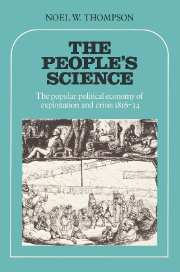Book contents
- Frontmatter
- Contents
- Preface
- Introduction
- 1 Changing attitudes to political economy in the working-class press 1816–34
- 2 The need for a working-class political economy
- 3 Charles Hall and Robert Owen: anti-capitalist and socialist political economy before the Ricardian socialists
- 4 Ricardian socialists/Smithian socialists: what's in a name?
- 5 The theory of labour exploitation and the working-class press 1816–30
- 6 The theory of labour exploitation and the working-class press 1830–34
- 7 Early socialist political economy and the theory of capitalist crisis
- 8 The popular political economy of crisis 1816-34
- Conclusion
- Bibliography
- Index
- Frontmatter
- Contents
- Preface
- Introduction
- 1 Changing attitudes to political economy in the working-class press 1816–34
- 2 The need for a working-class political economy
- 3 Charles Hall and Robert Owen: anti-capitalist and socialist political economy before the Ricardian socialists
- 4 Ricardian socialists/Smithian socialists: what's in a name?
- 5 The theory of labour exploitation and the working-class press 1816–30
- 6 The theory of labour exploitation and the working-class press 1830–34
- 7 Early socialist political economy and the theory of capitalist crisis
- 8 The popular political economy of crisis 1816-34
- Conclusion
- Bibliography
- Index
Summary
Discussing the works of Mrs Marcet and Miss Martineau in an Edinburgh Review article of 1833, William Empson lamented that political economy, ‘The science, which from its object ought to be pre-eminently the people's science, has yet made but little way to popular power and favour.’ Such chagrin was justified. A generation of propagandists and would-be educators had plied their pens, with a vigour matched only by their conviction, to popularise what they saw as the fundamental tenets of classical orthodoxy. Yet, by 1833 at any rate, there was little indication that their proselytising had won the hearts and minds of the labouring classes for whose benefit they wrote. Nevertheless, Empson's outburst of annoyance is, in a sense, misleading. The labouring classes had not rejected political economy per se but only that brand of political economy purveyed by the classical popularisers. Indeed, by the date of Empson's review political economy had gone a considerable way towards achieving the status of a people's science. However, the science espoused was not that of the Mills, Ricardo, Torrens, McCulloch, Senior and their admiring acolytes but rather that of Hodgskin, Thompson, Gray, Owen and other, lesser, anti-capitalist and socialist political economists.
- Type
- Chapter
- Information
- The People's ScienceThe Popular Political Economy of Exploitation and Crisis 1816–34, pp. 1 - 7Publisher: Cambridge University PressPrint publication year: 1985



